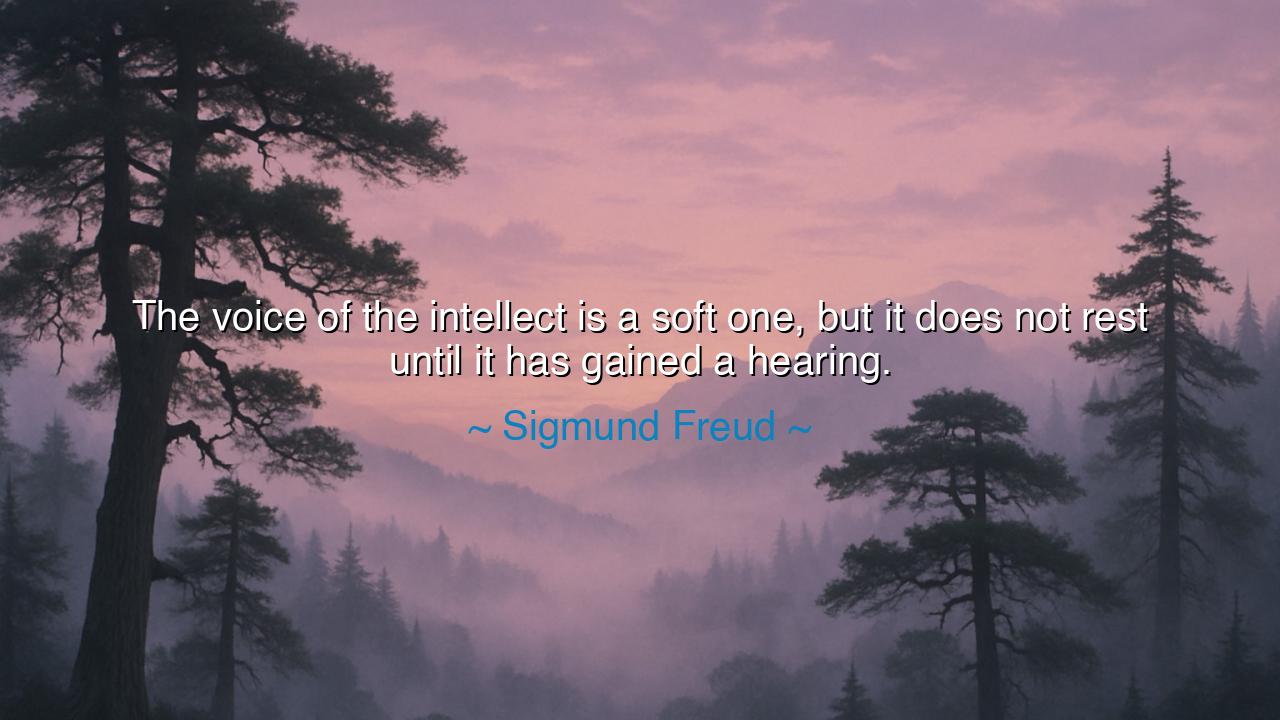
The voice of the intellect is a soft one, but it does not rest
The voice of the intellect is a soft one, but it does not rest until it has gained a hearing.






“The voice of the intellect is a soft one, but it does not rest until it has gained a hearing.” Thus wrote Sigmund Freud, the father of psychoanalysis, whose life’s work was to uncover the secret dialogue between reason and desire, between the mind’s quiet knowing and the heart’s tumultuous will. His words remind us that truth and reason, though often faint in the beginning, are patient forces. They do not shout, but whisper—yet that whisper endures through storms, until at last it is heard.
Freud’s saying springs from his contemplation of the conflict between intellect and instinct, a struggle he saw within every human being. The intellect, or rational mind, is gentle in tone; it speaks not with the fire of emotion but with the clarity of understanding. The passions, by contrast, roar and demand. They are loud, impulsive, and immediate. And yet, Freud believed, the soft voice of reason—if given time—will triumph. For though emotion surges and fades, truth is persistent; it will not rest until it finds its way into consciousness and reshapes the soul.
The origin of this insight lies in Freud’s lifelong effort to reveal what he called the “unconscious mind.” He watched how people often denied reality, chasing illusions to escape pain or guilt. Yet, despite their resistance, the truth within them—the voice of the intellect—continued to press forward, seeking acknowledgment. In dreams, slips of the tongue, or quiet moments of reflection, the mind’s buried wisdom whispered to be heard. Freud saw this in his patients: the truth they feared would surface again and again until they faced it. The intellect might be soft, but it was indomitable.
This truth does not belong only to the study of the mind; it belongs to all of life. Consider Galileo Galilei, who, centuries before Freud, dared to say that the Earth moves around the Sun. His words were quiet against the thunder of the Church’s authority, yet his intellect would not rest. He was silenced, imprisoned, and humiliated, but the truth he spoke could not be buried. Years later, his “soft voice” became the foundation of modern science. So it is with every great truth—it may begin as a whisper against the world’s noise, but it endures until the world must listen.
The intellect’s voice is soft not because it is weak, but because it is sure. It does not need to shout. Its power lies in its persistence, its calm, its refusal to yield to lies. Even in our personal lives, we feel this truth. There are moments when emotion urges us toward folly, when pride blinds us to error, when desire leads us astray—but deep within, a quieter knowing speaks. It may be inconvenient, even painful, yet it is unrelenting. One may ignore it for a time, but not forever. Reason waits, patient and tireless, until it claims its due.
Freud’s words also remind us that intellectual courage is not loud or dramatic. It is the courage of endurance—the willingness to hold to truth even when others dismiss or despise it. Many prefer comfort to clarity, illusion to understanding. But the wise cultivate within themselves the discipline to listen to the quiet voice, to seek knowledge even when it disturbs. For wisdom does not come to those who chase noise, but to those who can sit in stillness and hear the faint echo of the real.
So, my child of thought and longing, remember this: listen for the soft voice within you. Do not be deceived by the clamor of impulse or the persuasion of crowds. Truth is seldom loud; it often speaks gently, persistently, through conscience, reason, or intuition. When you hear it, do not turn away. Let it shape your actions, your art, your life. For the voice of the intellect, though quiet, is the guardian of your destiny—and once it has spoken, it will never rest until you heed it.
In the end, Freud’s wisdom is both a warning and a promise. The world may ignore reason for a time, but truth endures. It moves slowly, like water through stone, wearing down every barrier until it finds light. Trust in that patience—within yourself and within humanity. For the soft voice of intellect, though often dismissed, is eternal—and it will not rest until it has been heard.






AAdministratorAdministrator
Welcome, honored guests. Please leave a comment, we will respond soon